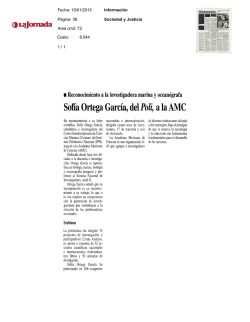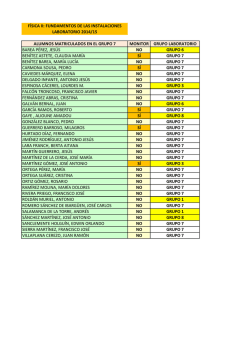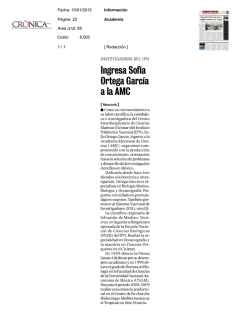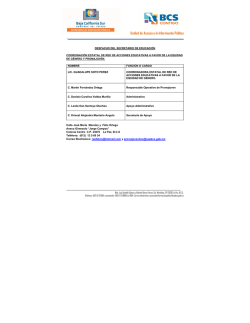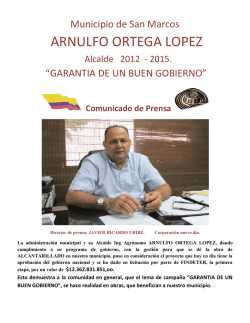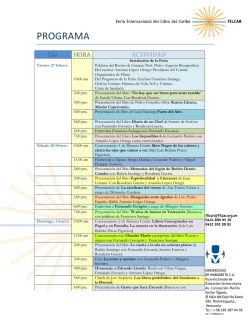
Northeastern Illinois University
1 NEIU: WL&C – SPAN 323 Latin American Literature II: Syllabus Instructor: Lucrecia Artalejo, Ph. D. Associate Professor of Spanish & Latin American Literatures & Graduate Advisor of the MA in Latin American Literatures &Cultures E-Mail Address: [email protected] Work Phone: (773) 442-4755 Office Location: Northeastern Illinois University LWH 2035 5500 North St. Louis Avenue Chicago, Illinois 60625-4699 Office Hours: Tuesdays & Thursdays: from 3:00 pm to 4:15 pm and from 5:30 pm to 7: 05 pm. Other times by appointment. My Personal Profile: Thank you for joining me, in a journey that it is going to be challenging academically speaking, but also very pleasant due to the beautiful nature of the literature that we will be exploring together: some of the most representative literary works of Latin American writers of the 20th and the 21st centuries. I was born in La Habana, Cuba, but I was raised in Puerto Rico. I can happily say that I have spent many of the years of my life in Chicago, proudly teaching at NEIU, which has been my first and only job since 1986. I earned my B.A. from the University of Puerto Rico (Río Piedras) in 1981, and my M.A. and Ph.D. from Cornell University at Ithaca, New York in 1987. The topic of my Ph.D. dissertation was the national identity of Cuba through the literary works of three Cuban writers: Cirilo Villaverde, Carlos Loveira, and Antonio Benítez Rojo. My first and only book published so far is La máscara y el marañón: la identidad nacional cubana, based on my Ph.D. dissertation. I am delighted to teach this course on Latin American Literature of the 20th and 21st Century, because we will concentrate on the literary works of various Latin American writers who I had the pleasure to meet personally during my years studying at the University of Puerto Rico, and at Cornell University. The textbook selected for this course, Letras de Hispanoamérica. Nueva antología de la literatura de las Américas (2014) by Julio Ortega, Gustavo Pellón, and Martín Gaspar brings together some passages of the most representative literary works of my favorite Latin American authors. I think that while studying them, you will also fall in love with the rewarding experience of consulting peer-reviewed articles on the primary sources studied, so that they are taken into consideration in class discussions, and in the written assignments, as well. Consulting peer-reviewed articles will definitely help you to become wise literary critics. This process will certainly prepare you well for your future academic and professional activities in the realm of Hispanic Studies. 2 Course Description This is a 3 credit course conducted in Spanish. It will start with the study of one astonishing passage of Miguel Ángel Asturias´s El señor presidente (1946). Through the analysis of that thought-provoking chapter by Miguel ‘Angel Asturias (1899-1974), we will be able to perceive various inceptions in Latin American letters: the emergence of “Magical Realism”, the literary style so rooted in the richness of the traditions of the Mayan Quiché population, and also related to Surrealism in its beginning, and also, the appearance of one of the first and best novels written against dictatorships in Latin America. After our study of a chapter of El señor presidente, it will be very obvious why this Guatemalan author was granted the Nobel Prize in 1967. The study of the Latin American Poetry of the 20th Century will be preceded by the analysis of some passages of Ariel (1900) by José Enrique Rodó (Uruguay; 1871-1917), one of the preeminent theorists of the Modernista school of literature, that had a strong impact in the poetic expression of Latin America. As other Modernista writers, such as José Martí and Rubén Darío, Rodó warned Latin-America against the perils of materialism and utilitarianism, so widely defended in the United States of America, whose influence in the Latin American Culture was deemed as an imminent menace. Our analysis of Rodó´s essay will serve as the preamble to the close reading of a selection of the poetry by the following Latin American writers: Delmira Agustini (Uruguay 1886-1914), César Vallejo (Perú, 1892-1938), Vicente Huidobro (Chile; 1893-1948), and Alfonsina Storni (Switzerland; 1892-1938). Taking into consideration that the essay is one of the most relevant genres produced in Latin America throughout the 20th and 21st century, it seems smart to study very representative essays written by Alfonso Reyes (México; 1889-1959), and José Carlos Mariátegui (Perú; 18941930). While Alfonso Reyes focuses in his essay Última Tule (1942) on the essential aspiration to maintain Latin American countries united, José Carlos Mariátegui studies the need to improve the living conditions of the Indian population in Perú by cancelling the left- overs of feudalism. This is precisely the main idea of his essay “El problema del indio”, one of the Siete ensayos de interpretación de la realidad peruana (1928). “El Boom” in Latin America is definitely the center of this course. This vital topic of the Latin American Letters of the 20th century will be covered through the close reading of very representative literary works produced by the following authors: Pablo Neruda (Chile; 19041973), Juan Rulfo (México; 1918-86), Nicolás Guillén (Cuba; 1902-1989), Jorge Luis Borges (Argentina; 1899-1986), Julio Cortázar (Belgium; 1914-1984), Gabriel García Márquez (Colombia; 1927-2014), Mario Vargas Llosa (Perú; b. 1936), Carlos Fuentes (Panamá; 19282012), Octavio Paz (México; 1914-2012), Alejo Carpentier (Suiza; 1904-1980), José Lezama 3 Lima (Cuba; 1910-1976), Rosario Castellanos (México; 1925-1974), Sergio Vodanović (Croatia; 1926-2001), José Donoso (Chile; 1924-1996), Nicanor Parra (Chile; b. 1914), and Guillermo Cabrera Infante (Cuba; 1929-2005). The close reading of a selection of the literary works of these canonical writers will give us the opportunity to explore different genres--poetry, short-stories, essays, plays, and even the first chapter of their best novels—and the chance to perceive their ontological obsessions as well as their serious commitment to the Latin American political and sociological realities. The course will conclude with the examination of two of the most challenging , controversial and/or attractive literary expressions in Contemporary Latin American letters: the Testimonial Literature, aiming to give voice to the voiceless in a society whose structures must definitely be changed, and the Latino Literature, the literary writings produced by Hispanics in USA, where Spanish is no longer a foreign language but a highly flexible code to express the dilemmas of the Hispanic population, struggling to develop their own identity within the USA shores. The study of the Latin American Testimonial Literature will concentrate on the prose of Elena Poniatowska (Paris; b. 1932), Alfredo Bryce Echenique (Perú; b. 1939), Ernesto Cardenal (Nicaragua; b. 1925), Rosario Ferré (Puerto Rico; n. 1938), Manuel Puig (Argentina; 1941), Cristina Peri Rossi (Uruguay; b. 1941) and Roberto Bolaño (Chile; 19532003). The analysis of some of the literary works of Pedro Juan Soto (1928-2002), Julia de Burgos (Puerto Rico; 1914-1953), Francisco Jiménez (México; b. 1943), Edmundo Paz Soldán (Bolivia; b. 1967), and Mayra Santos Febres (Puerto Rico; b. 1966) will constitute the big finale of our journey into the realms of the Latin American Literature of the 20th and the 21st centuries. Course Objectives/Outcomes Students will: 1. Demonstrate the ability to read very representative works of poetry and prose from several Hispanic American countries, such as Argentina, Chile, Colombia, Cuba, México, Nicaragua, Perú, Puerto Rico, and Uruguay, among others, to discuss them, and to write about them in Spanish 2. Develop an understanding of what constitutes the different literary genres. 3. Write some one page compositions on the works assigned to be discussed in class. 4. Take 2 Take-home Exams, based on the literary works discussed in class: the Mid-term Exam, and the Final Exam. 5. Master the mechanics of writing such as selecting an attractive, and significant title for a written work, correct division in paragraphs, and the consistency in punctuation. 6. Study the MLA style for the presentation of research papers including different techniques on the use of quotations, the parenthetical references, and the list of works cited. 7. Write a 7-page term paper about a Contemporary Spanish American writer, consulting secondary sources from the library books/databases. Students will be able to write this 7-page research paper on a Contemporary Spanish American book that really called their attention and that has somehow changed their concept of a particular nation or their world view. They must share an original interpretation of that text with their classmates by means of a brief presentation after they have consulted secondary sources and written their paper. The instructor is very open to suggestions regarding the selection of that book and the topic of the paper, but it should be done in consultation with her. 8. Develop a more in depth awareness of cultural similarities, and differences among the people of the Hispanic nations, through the reading of literary works from different countries. 4 Required Textbook: Ortega, Julio, Gustavo Pellón y Martín Gaspar. Letras de Hispanoamérica. Nueva Antología de las Américas. Boston: Vista Higher Learning, 2014. (Available at Becks in our campus) Electronic Portfolio The Department of World Languages and Cultures requires declared majors in designated courses (including this one) to upload one or more assignments to an electronic portfolio. Portfolios will be used for program assessment and are routinely used by students entering the job market to showcase potential employers the work they have done in college. For this particular course, declared majors will be uploading their Mid-term Exam in their electronic portfolio. Desire2Learn’s Portfolio’s feature must be used. The rubric that will be used to evaluate both exams has been posted in this departmental site: http://hub-prod.neiu.edu/sites/hub.neiu.edu/files/documents/tegriffi/Rubric%207m.pdf Evaluation/Assessment Criteria: Attendance and Participation in class Weekly Compositions Assigned as Homework Mid-term Take-Home Exam Take-Home Final Exam II 7 page Research Paper Academic integrity: 10% 10% 30% 30% 20% SPAN 323: Literatura Latinoamericana II Calendario para la Primavera 2015 Prof. Lucrecia Artalejo Sesión Preliminar: Presentación del curso y discusión de las reglas de nuestro juego. Fecha: 6 de enero del 2015. ------------------------------------------------------------------------------------------------------------------------------Sesión 1: Miguel Ángel Asturias: “La tumba viva” de El señor presidente, 1946 (Ortega y otros 290-97) y José Enrique Rodó: “Ariel” (Ortega y otros 298-303) Fecha: 8 de enero del 2015. …………………………………………………………………………………………………………………………………………………………………. Sesión 2: Delmira Agustini: “El vampiro”, “Nocturno”, “Otra estirpe” (Ortega y otros 304-09) y César Vallejo: “Los heraldos negros”, “Voy a hablar de la esperanza”, “Trilce”, “Me viene, hay días, una gana ubérrima, política…”, “Piedra negra sobre una piedra blanca”, “Masa”, “Trilce no quiere decir nada” (Ortega y otros 310-21) Fecha: 13 de enero del 2015. ------------------------------------------------------------------------------------------------------------------------------Sesión 3: Vicente Huidobro: “Arte poética”, “La poesía” “Altazor”, “La poesía es un atentado celeste”, “El espejo de agua”, “Preludio de Esperanza” (D2L# 5) (Ortega y otros 322-35) y Alfonsina Storni: “Tú me quieres blanca”, “Peso ancestral”, “A Eros”, “Palabras a Delmira Agustini”, “Hombre pequeñito”, “Cuadrados y ángulos” (D2L# 6) (Ortega y otros 336-41) Fecha: 15 de enero del 2015. ------------------------------------------------------------------------------------------------------------------------------Sesión 4: Alfonso Reyes: “Capricho de América” de Última Tule (Ortega y otros 342-47) José Carlos Mariátegui: “El problema del Indio” (Ortega y otros 348-55) Fecha: 20 de enero del 2015. ------------------------------------------------------------------------------------------------------------------------------Sesión 5: Gustavo Pellón: “El Boom” (Ortega y otros 357-61) y Pablo Neruda: “Poema 20”, “Walking Around”, “Alturas de Macchu Picchu”, “Oda al tomate”, “Principio y fin de un destierro”, “La mujer de los ´Veinte poemas´” (Ortega y otros 364-75) Fecha: 22 de enero del 2015. ------------------------------------------------------------------------------------------------------------------------------Sesión 6: Juan Rulfo: “Macario”, “No oyes ladrar los perros”(Ortega y otros 376-87) Nicolás Guillén: “Sensemayá”, “Balada de los dos abuelos”, “Angustia primera” (Ortega y otros 388-95) Fecha: 27 de enero del 2015. ------------------------------------------------------------------------------------------------------------------------------Sesión 7: Jorge Luis Borges: “El sur”, “Borges y yo”, “Doomsday”, “La muerte y la brújula”, “Poema de los dones”, “Un poema, tres ciegos y una biblioteca” (Ortega y otros 396-415) Fecha: 29 de enero del 2015. ------------------------------------------------------------------------------------------------------------------------------Sesión 8: Julio Cortázar: ¨ “La noche boca arriba”, “Rayuela”, “El niño nuevo”, “Los ´lectores cómplices´ de Rayuela” (Ortega y otros 418-31) Fecha: 3 de febrero del 2015. Sesión 9: Gabriel García Márquez: “Cien años de soledad”, “La prodigiosa tarde de Baltazar” , “La luz es como el agua”, “La soledad de América Latina”, “La soledad de los Buendía” (Ortega y otros 432-59) Fecha: 5 de febrero del 2015. 6 ------------------------------------------------------------------------------------------------------------------------------Sesión 10: Mario Vargas Llosa: “La casa verde”, “La verdad de las mentiras”, “La técnica puede ser un personaje más” (Ortega y otros 462-79) Fecha: 10 de febrero del 2015. ------------------------------------------------------------------------------------------------------------------------------Sesión 11: Carlos Fuentes: “La pena” y “Hernán Cortés” (Ortega y otros 480-501) y Octavio Paz: “Himno entre ruinas”, “El cántaro roto”, “Los hijos de la Malinche” y “Árbol adentro” (Ortega y otros 502-21) Fecha: 17 de febrero del 2015. ------------------------------------------------------------------------------------------------------------------- -----------Sesión 12: Alejo Carpentier: “Prólogo de El reino de este mundo” y “Viaje a la semilla” (Ortega y otros 522-39) Entrega del “Mid -Term Exam”: Este examen deberá ponerse en el S.!2 Buzón de Entrega de la Sesión 12 de nuestro curso en D2L a las 8: 00 P.M. para ser evaluado siguiendo las pautas establecidas por el departamento… Los estudiantes deberán incluirlo después en su portafolio electrónico con la evaluación correspondiente y será utilizado por el departamento para examinar el programa. Fecha: 19 de febrero del 2015. ------------------------------------------------------------------------------------------------------------------------------Sesión 13: Alejo Carpentier: “Prólogo de El reino de este mundo” y “Viaje a la semilla” (Ortega y otros 522-39) y José Lezama Lima: “Ah, que tú escapes” y “Rapsodia para el mulo” (Ortega y otros 540-47) Fecha: 24 de febrero del 2015. ------------------------------------------------------------------------------------------------------------------------------Sesión 14: Rosario Castellanos: “Y las madres, ¿qué opinan” y “Autorretrato” (Ortega y otros 548-555) y Sergio Vodanović: “El delantal blanco” (Ortega y otros 556-67). 26 de febrero del 2015. -----------------------------------------------------------------------------------------------------------------------------Sesión 15: José Donoso: Santelices” (Ortega y otros 568-87) y Nicanor Parra: “Manifiesto” y “El túnel” (Ortega y otros 588-95). Fecha: 3 de marzo del 2015. ------------------------------------------------------------------------------------------------------------------------------Sesión 16: Guillermo Cabrera Infante: “Tres tristes tigres” (Ortega y otros 596-603) Fecha: 5 de marzo del 2015. -----------------------------------------------------------------------------------------------------------------------------Sesión 17: Martín Gaspar: “Testimonios de la democratización” (Ortega y otros 605-08) y Elena Poniatowska: “La noche de Tlatelolco” (Ortega y otros 612-21) Fecha: 10 de marzo del 2015. ------------------------------------------------------------------------------------------------------------------------------Sesión 18: Alfredo Bryce Echenique: “El palacio original” (Ortega y otros 622-35) Entrega de la propuesta para el trabajo final: el título, la síntesis/el “abstract “ y la bibliografía que se empleará siguiendo las normas de la MLA… Fecha: 12 de marzo del 2015. ------------------------------------------------------------------------------------------------------------------------------Sesión 19: Ernesto Cardenal: “Epigramas”, “Como latas de cervezas vacías”, “Salmo 5” (Ortega y otros 636-41) Entrega del Trabajo de Investigación de 7 páginas, incluyendo la bibliografía, impreso en mi buzón frente a mi oficina en LWH 2035 a la hora de clase. Fecha: 24 de marzo del 2015 ------------------------------------------------------------------------------------------------------------------------------.Sesión 20: Rosario Ferré: “La muñeca menor” (Ortega y otros 646-53) 7 Manuel Puig: “El beso de la mujer araña” (Ortega y otros 654-71) y Cristina Peri Rossi: “La navidad de los lagartos” (Ortega y otros 672/79). Fecha: 7 de abril del 2015. Sesión 21: Martín Gaspar: Roberto Bolaño: “El ojo silva (Ortega y otros 692-703), “Letras hispanas de los Estados Unidos” (Ortega y otros 705-08) Fecha: 9 de abril del 2015. ------------------------------------------------------------------------------------------------------------------------------Sesión 22: Pedro Juan Soto: “La cautiva” (Ortega y otros 712-21) y Julia de Burgos: “A Julia de Burgos” (Ortega y otros 722-27). Fecha: 14 de abril del 2015. -----------------------------------------------------------------------------------------------------------------------------------------Sesión 23: Francisco Jiménez: “Expulsados” (Ortega y otros 736-45) Edmundo Paz Soldán: “Faulkner” (Ortega y otros 752-57) Fecha: 16 de abril del 2015. ------------------------------------------------------------------------------------------------------------------------------Sesión 24: Mayra Santos Febres: “Sirena Selena vestida de pena” (D2L # 39) (Ortega y otros 776-83) y Conclusión general sobre el panorama de la literatura hispanoamericana del siglo XXI ante la crítica. Fechas: 21 y 25 de abril del 2015. ------------------------------------------------------------------------------------------------------------------------------Sesión 25: Entrega del Examen Final al S.25 Buzón de Entrega en la Sesión 25 de nuestro curso en D2L Fecha límite: 28 de abril del 2015. ------------------------------------------------------------------------------------------------------------------------------P.S. Mis queridos estudiantes: Como las demás ilustraciones que aparecen en este documento y en mi portal de D2L, esta es de la artista colombiana Catalina Estrada que ahora vive en Barcelona… ¡Ojalá que tengamos todos un semestre fenomenal puesto que nos está esperando la alegre primavera y un bello e intenso verano!… ¡Gracias por acompañarme en este divertido viaje por la literatura hispanoamericana! Atentamente, Lucrecia
© Copyright 2026
